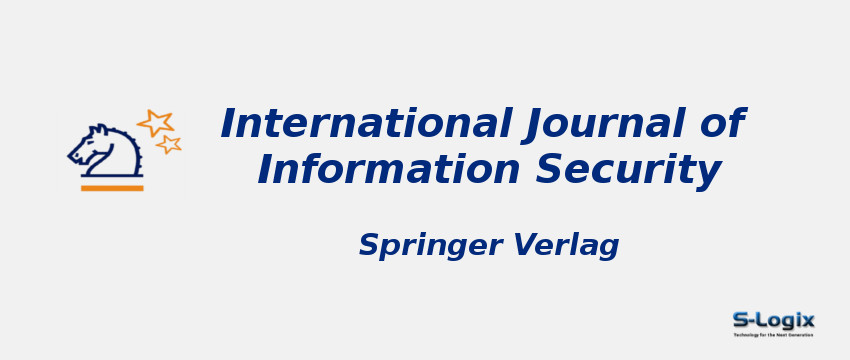International Journal of Information Security is a leading peer-reviewed journal dedicated to the field of information security. It publishes high-quality research articles, reviews, and short communications that cover all aspects of information security, including theoretical, practical, and technological advancements.
Objective:
The primary objective of the journal is to advance the knowledge and practice of information security by disseminating cutting-edge research and innovative solutions. The journal aims to address the challenges and opportunities in securing information systems and protecting data integrity and privacy.
Interdisciplinary Focus:
The journal interdisciplinary focus allows it to encompass a wide range of topics such as cryptography, network security, software security, privacy protection, security protocols, and cyber-physical systems security. This broad scope promotes the integration of different perspectives and techniques to enhance information security.
Global Reach and Impact:
International Journal of Information Security has a global reach, attracting contributions from researchers, academics, and professionals worldwide. The journal impact is evident in its high citation rates and its role in influencing both research and practice in the field of information security.
High Standards and Rigorous Review:
The journal maintains high standards through a rigorous peer-review process, ensuring that only high-quality and relevant research is published. This thorough review process helps uphold the journal reputation for excellence and reliability in the field of information security.
Significance:
By providing a platform for the dissemination of pioneering research and innovative solutions, the International Journal of Information Security plays a crucial role in advancing the field of information security. The journal contributes to the development of new methodologies, the improvement of security practices, and the overall enhancement of information protection measures globally.
Journal Home: Journal Homepage
Editor-in-Chief: Sokratis Katsikas
scope:
The International Journal of Information Security is a peer-reviewed academic journal that focuses on the latest research, methodologies, and applications in the field of information security. The journal aims to provide a comprehensive platform for researchers, practitioners, and policymakers to discuss and disseminate knowledge related to protecting information systems and data from threats and vulnerabilities. Below are the key focus areas and scope of the journal:
1. Cryptography and Cryptanalysis:
Research on the development and analysis of cryptographic algorithms and protocols.
Studies on cryptographic key management, encryption, and decryption techniques.
Advances in cryptanalysis methods for evaluating the security of cryptographic systems.
2. Network Security:
Exploration of techniques and technologies for securing computer networks.
Research on intrusion detection systems, firewalls, and network access control.
Advances in securing wireless networks, mobile networks, and the Internet of Things (IoT).
3. Information Assurance:
Studies on policies, procedures, and practices for ensuring the confidentiality, integrity, and availability of information.
Research on risk assessment, security audits, and compliance with security standards and regulations.
Advances in security management frameworks and best practices for information assurance.
4. Security Protocols and Architectures:
Exploration of secure communication protocols and system architectures.
Research on the design, analysis, and implementation of security protocols.
Advances in secure software development practices and secure coding techniques.
5. Access Control and Authentication:
Studies on mechanisms for controlling access to information and resources.
Research on authentication methods, including biometrics, multi-factor authentication, and single sign-on (SSO).
Advances in authorization models and techniques for ensuring secure access control.
6. Data Security and Privacy:
Exploration of techniques for protecting data from unauthorized access and breaches.
Research on data encryption, data masking, and secure data storage.
Advances in privacy-preserving technologies and methods for ensuring data privacy.
7. Malware and Threat Analysis:
Studies on the detection, analysis, and mitigation of malware and other security threats.
Research on advanced persistent threats (APTs), ransomware, and botnets.
Advances in threat intelligence and techniques for proactive threat management.
8. Cybersecurity in Emerging Technologies:
Exploration of security challenges and solutions in emerging technologies such as cloud computing, blockchain, and artificial intelligence.
Research on securing virtual environments, distributed ledger technologies, and machine learning systems.
Advances in developing security frameworks for new and evolving technologies.
9. Human Factors in Information Security:
Studies on the role of human behavior and psychology in information security.
Research on user awareness, training, and education for improving security practices.
Advances in designing user-centric security solutions and mitigating human-related security risks.
10. Security in Cyber-Physical Systems:
Exploration of security issues in cyber-physical systems (CPS) and critical infrastructure.
Research on securing industrial control systems, smart grids, and transportation systems.
Advances in resilience and robustness of cyber-physical systems against cyber-attacks.
Print ISSN: 1615-5262
Electronic ISSN: 1615-5270
Abstracting and Indexing: Science Citation Index Expanded, Scopus.
Imapct Factor 2023: 3.2
Subject Area and Category: Computer Sciences, Library and Information Science, Electronics and Telecommunications, Industrial Engineering
Publication Frequency: Bimonthly
H Index: 51
Q1:
Q2: Computer Networks and Communications
Q3:
Q4:
Cite Score: 6.3
SNIP: 1.339
Journal Rank(SJR): 0.878
Latest Articles: Latest Articles in International Journal of Information Security
Guidelines for Authors: International Journal of Information Security Author Guidelines
Paper Submissions: Paper Submissions in International Journal of Information Security
Publisher: Springer Berlin Heidelberg
Country: Germany
